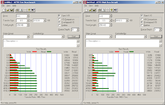malware
New Member
- Joined
- Nov 7, 2004
- Messages
- 5,422 (0.73/day)
- Location
- Bulgaria
| Processor | Intel Core 2 Quad Q6600 G0 VID: 1.2125 |
|---|---|
| Motherboard | GIGABYTE GA-P35-DS3P rev.2.0 |
| Cooling | Thermalright Ultra-120 eXtreme + Noctua NF-S12 Fan |
| Memory | 4x1 GB PQI DDR2 PC2-6400 |
| Video Card(s) | Colorful iGame Radeon HD 4890 1 GB GDDR5 |
| Storage | 2x 500 GB Seagate Barracuda 7200.11 32 MB RAID0 |
| Display(s) | BenQ G2400W 24-inch WideScreen LCD |
| Case | Cooler Master COSMOS RC-1000 (sold), Cooler Master HAF-932 (delivered) |
| Audio Device(s) | Creative X-Fi XtremeMusic + Logitech Z-5500 Digital THX |
| Power Supply | Chieftec CFT-1000G-DF 1kW |
| Software | Laptop: Lenovo 3000 N200 C2DT2310/3GB/120GB/GF7300/15.4"/Razer |
Solid-state drives are relatively new technology for anyone of us, and up until now we've heard only good things about them. They are fast, small, they have no moving parts, but what happens after extensive use of the flash memory that is incorporated in them? Yesterday a review was posted over at PC Perspective, entitled "Long-term performance analysis of Intel Mainstream SSDs". According to the information posted, it appears that Intel's X25-M MLC SSD drives may degrade in performance after a period of time when they are put to extensive use. PC Per claims that once an Intel solid-state drive is used, after a period of time it will no longer be as fast as a new one, neither its rated transfer speeds will be the same.
In response, Intel stated today: "Our labs currently have not been able to duplicate these results," "In our estimation, the synthetic workloads they use to stress the drive are not reflective of real world use. Similarly, the benchmarks they used to evaluate performance do not represent what a PC user experiences." Intel also said: "In general, when a PC's drive (SSD or HDD) is full, there will be some reduction in system performance, however the performance reduction reported by PC Perspective is higher than we generally expect, which is why we are looking into the methodology."
We'll keep you posted if there's new information on the matter.

View at TechPowerUp Main Site
In response, Intel stated today: "Our labs currently have not been able to duplicate these results," "In our estimation, the synthetic workloads they use to stress the drive are not reflective of real world use. Similarly, the benchmarks they used to evaluate performance do not represent what a PC user experiences." Intel also said: "In general, when a PC's drive (SSD or HDD) is full, there will be some reduction in system performance, however the performance reduction reported by PC Perspective is higher than we generally expect, which is why we are looking into the methodology."
We'll keep you posted if there's new information on the matter.

View at TechPowerUp Main Site



